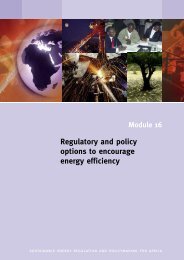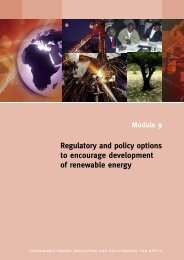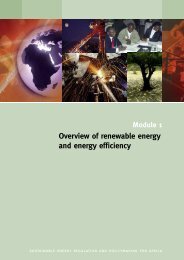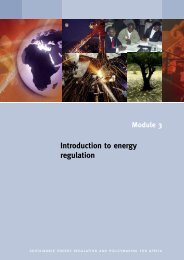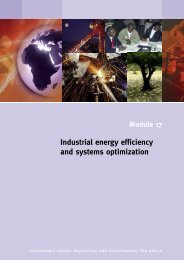Increasing access to energy services in rural areas - REEEP ...
Increasing access to energy services in rural areas - REEEP ...
Increasing access to energy services in rural areas - REEEP ...
Create successful ePaper yourself
Turn your PDF publications into a flip-book with our unique Google optimized e-Paper software.
MODULE 10: INCREASING ACCESS TO ENERGY SERVICES IN RURAL AREAS<br />
page 10.91<br />
1. INTRODUCTION<br />
In 1993, the Brazilian electricity sec<strong>to</strong>r <strong>in</strong>itiated a restructur<strong>in</strong>g process by<br />
unbundl<strong>in</strong>g the generation, transmission and distribution components of the exist<strong>in</strong>g<br />
companies. This ultimately led <strong>to</strong> the privatization of most distribution assets<br />
and some of the generation assets. However, little attention was paid <strong>to</strong> the<br />
process of expand<strong>in</strong>g <strong>services</strong> <strong>to</strong> low-<strong>in</strong>come and <strong>rural</strong> <strong>areas</strong>. This case study provides<br />
successful examples of policy, regula<strong>to</strong>ry and <strong>in</strong>stitutional arrangements<br />
that facilitate the expansion of electricity supply <strong>to</strong> low-<strong>in</strong>come consumers and<br />
<strong>rural</strong> <strong>areas</strong>.<br />
The federal government and other donors support a variety of <strong>in</strong>itiatives designed<br />
<strong>to</strong> promote <strong>rural</strong> electrification. Federal programmes <strong>in</strong>clude PRODEEM (managed<br />
by the M<strong>in</strong>istry of M<strong>in</strong>es and Energy), Luz no Campo (managed by Eletrobrás),<br />
and Luz para Todos, which expects <strong>to</strong> provide full electrification <strong>in</strong> the country by<br />
2008. There are also <strong>rural</strong> electrification activities under several non-sec<strong>to</strong>ral and<br />
decentralized <strong>in</strong>itiatives. In addition, the National Bank of Social and Economic<br />
Development (BNDES) is structur<strong>in</strong>g credits <strong>to</strong> f<strong>in</strong>ance electrical <strong>in</strong>terconnection<br />
<strong>to</strong> <strong>rural</strong> households that already <strong>in</strong>cur significant expenditures on kerosene and<br />
batteries and could afford a US$ 4 per month electricity bill.<br />
Diesel oil consumed for electricity generation <strong>in</strong> isolated <strong>areas</strong> is subsidized<br />
through the Fuel Consumption Account – CCC (Conta de Consumo de Combustível).<br />
This account is funded by <strong>energy</strong> utilities from special taxes on electricity bills for<br />
households <strong>in</strong> the <strong>in</strong>terl<strong>in</strong>ked system. The CCC helps <strong>to</strong> expand electricity <strong>access</strong><br />
<strong>to</strong> isolated communities. In 1998, the CCC was extended <strong>to</strong> renewable <strong>energy</strong> projects<br />
<strong>in</strong> isolated communities which <strong>to</strong>tally or partially substitute diesel generation.<br />
2. THE PRODEEM PROGRAMME<br />
The Programa de Desenvolvimen<strong>to</strong> Energético de Estados e Municípios —<br />
PRODEEM (Energy Development of States and Municipalities Programme) — is<br />
the ma<strong>in</strong> government sponsored programme that aims <strong>to</strong> promote off-grid electrification<br />
of villages. Established by a presidential decree <strong>in</strong> 1994, PRODEEM is<br />
sponsored by <strong>in</strong>ternational donors and is implemented ma<strong>in</strong>ly through Brazilian<br />
utilities. It consists of several pilot off-grid electrification <strong>in</strong>itiatives us<strong>in</strong>g pho<strong>to</strong>voltaic<br />
(PV), w<strong>in</strong>d or hybrid systems, and also conventional fossil fuels <strong>in</strong> remote<br />
villages. From 1996 <strong>to</strong> 2000, PRODEEM provided 3 MW <strong>in</strong> solar pho<strong>to</strong>voltaic (PV)<br />
panels <strong>to</strong> 3,050 villages, benefit<strong>in</strong>g 604,000 people on the basis of a <strong>to</strong>tal <strong>in</strong>vest-



